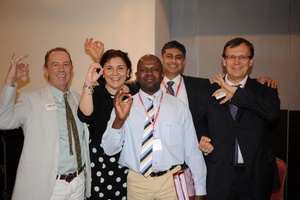Stop TB Partnership Coordinating Board approves new three-year Operational Strategy at its 22nd meeting
At its 22nd meeting, the Coordinating Board decided to embrace calls for greater ambition in TB and voted to endorse the Zeroes campaign. Mark Harrington (Treatment Action Group), Lucica Ditiu (Stop TB Partnership), David Mametja (South African Department of Health), Salmaan Keshavjee (Partners in Health) and Mario Raviglione (WHO) made the "zero" sign.

From left to right: Mark Harrington (Treatment Action Group), Lucica Ditiu (Stop TB Partnership), David Mametja (South African Department of Health), Salmaan Keshavjee (Partners in Health) and Mario Raviglione (WHO).
19 November - Kuala Lumpur, Malaysia - The Stop TB Partnership’s Coordinating Board has approved a three-year operational strategy that will act as a roadmap for how the Stop TB Partnership Secretariat contributes to delivering the Global Plan to Stop TB 2011-2015 and serves the wider Partnership.
The strategy prioritizes the activities that the Secretariat will implement based on its comparative advantages, feedback from partners and stakeholders and the current financial landscape. The four main objectives are to: facilitate meaningful and sustained collaboration among partners; increase political engagement by world leaders and key influencers; promote innovation in TB diagnosis and care through TB REACH and other platforms and initiatives; and ensure universal access to quality-assured TB medicines and diagnostics in countries served by the Global Drug Facility (GDF).
Meeting in Kuala Lumpur following the Union World Conference on Lung Health, the Coordinating Board decided to embrace calls for greater ambition in TB and voted to endorse the Zeroes campaign. The movement, which was started by several Partners with a small amount of seed funding from the Partnership, calls for zero TB deaths, zero TB infections and zero suffering from TB.
As the Stop TB Partnership embarks on its second decade, the Board also voted on a bold package of governance reforms affecting the Coordinating Board structures. The Board also endorsed the strategic framework for the Global Drug Facility, based on the lessons learned in 11 years of existence and re-shaping the interventions for the realities of 2012 and beyond.
Other discussions at the Board resulted in the way forward on the third wave of TB REACH grants and the Partnership’s approach to the development of the post-2015 development goals. The decision points will be available on the Stop TB Partnership website.
Source: Stop TB Partnership

